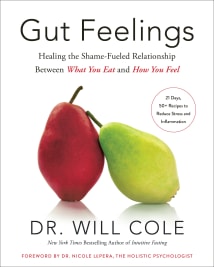Why "Shameflammation" Could Be At The Root Of Your Health Issues + How To Heal


Have you ever eaten a perfectly "healthy" meal and ended up bloated and with stomach pains? Often that's because you sat down stressed and anxious, ate while you were distracted or still in fight-or-flight mode, and then went back to your hectic day without a moment of peace or stillness.
Just like food, our thoughts and emotions have the power to make us feel terrible or fuel our bodies with vibrant health. In my years practicing functional medicine, I've seen any number of the following:
- I've seen patients with chronic digestive issues cut virtually every "trigger" food out of their diet but see their digestive health continue to decline because of chronic stress.
- I've seen patients try every exercise and diet that exists but continue to hold on to weight because their body is in fight or flight from an abusive relationship or past trauma.
- I've seen patients try every conventional and natural treatment to quell their autoimmune condition, trying to force it into submission instead of taking a break from their hyperintense job or exercise routine.
- I have many patients who don't know which came first—the digestive problem or the depression, the autoimmunity or the anxiety, the migraines or the mood disorder.
On the other end . . .
- I've seen patients quit a toxic job and completely reverse health conditions that had been getting worse for years.
- I've seen patients start meditating and investing in stress reduction and end up healing from chronic fatigue, hormone imbalances, inflammatory disorders, and so much more.
- I've seen patients start therapy and end up healing not just from anxiety and depression but also from migraines, allergies, IBS, psoriasis, acne—the list goes on.
- I've seen patient after patient break down in our consultations online, admitting that they feel sad, desperate, ignored, neglected, angry, or frustrated, and then report that they feel physical relief almost immediately just from being heard and letting their pent-up, suppressed emotions out.
When I see any of these patients going through experiences like the ones I mentioned above, the deeply mysterious, emotional nature of these situations always strikes me.
Despite our best efforts to control certain aspects of our health by taking our supplements and medications and eating all the "right" things, if we don't address the emotional component of our health, we can never truly heal. These are just a few of the many, many moments over the years that have made me a true believer in the bidirectional relationship between physical and emotional health.
Shameflammation
In my book The Inflammation Spectrum, I describe chronic inflammation as a smoldering fire within, a fire that goes largely unnoticed until it turns into any number of health problems. Well, throughout my years of treating patients and helping them get their bodies and minds back to vibrant health, I've seen the way that negative thoughts and emotions can subtly and systematically sabotage health, in much the same way that inflammation can. In fact, I see this phenomenon of emotional suffering causing physical suffering so often that I decided to give it its own name: shameflammation.
Shameflammation is present in every single one of us to some degree, and it can make us feel overwhelmed, anxious, hopeless, aimless, and totally disconnected from our intuition. It can be both the underlying cause and result of chronic health conditions—it's often the one thing standing between us and optimal health. Shameflammation can make us feel like we're constantly swimming upstream and at war with our bodies. Thoughts and emotions are like nutrients for your head, heart, and soul, and unfortunately, many of us have been feeding ourselves junk food for a long, long time.
So, now let's answer the question I know a lot of you are asking yourselves: Why shame? Out of all the negative emotions in this world, why do we use shame for the term that represents the negative impact of our emotional world on the physical? Over the years, I've learned that shame is perhaps the strongest, most damaging negative emotion of all. Brené Brown, a renowned shame and vulnerability researcher, says that "shame is lethal" and explains that shame affects all of us and profoundly shapes the way we interact in the world.
After years of consulting patients with all types of health struggles, I can say that nowhere is shame more at play than when it comes to our bodies and our health. It's often a huge barrier to healing. Let me ask you this: When something goes awry with your body or health, big or small, how do you feel? The answer is probably a mixture of anger, fear, and maybe even some embarrassment, right? That sounds a whole lot like shame to me. The common thread between many emotions, especially those surrounding our body and our health, is often shame.
Research shows1 that, as humans, we feel a lot of health-related shame and that shame can have a significant impact on our ability to stay healthy, heal from illness, and make healthy choices. Why? Because any type of shame—whether it's related to food, our body, or a health condition—makes us feel unworthy of the vibrant health we crave, cutting us off at our knees as we try to get there. According to shame experts, shame exists on a spectrum, ranging from self-consciousness or embarrassment to a deep sense of inadequacy and fear, but these feelings all tell us one thing at the end of the day—that we don't deserve that healthy and happy life.
Unfortunately, despite knowing that shame affects our health in big and small ways, we don't know all that much else due to a lack of research in this area.
In one fascinating study, researchers posited that the impact of shame on our health "is unacknowledged, under-researched, and under-theorized in the context of health and medicine." They go on to say that shame can have a significant impact on health, illness, and health-related behaviors and that shame's influence can be described only as "insidious, pervasive, and pernicious2." Pretty strong language, isn't it? It is, but it's also true.
Your healing can't shine when it's soaked in shame.
Excerpt courtesy of Gut Feelings: Healing the Shame-Fueled Relationship Between What You Eat and How You Feel. Copyright © 2023 by Will Cole. Published by goop Press, an imprint of Penguin Random House.

Will Cole, IFMCP, DNM, D.C., is a leading functional medicine expert who consults people around the globe, starting one of the first functional medicine telehealth centers in the world. Named one of the top 50 functional and integrative doctors in the nation, Dr. Will Cole provides a functional medicine approach for thyroid issues, autoimmune conditions, hormonal imbalances, digestive disorders, and brain problems. He is the host of the popular The Art Of Being Well podcast and the New York Times bestselling author of Intuitive Fasting, Ketotarian,The Inflammation Spectrum, and the brand new book Gut Feelings: Healing the Shame-Fueled Relationship Between What You Eat and How You Feel.
